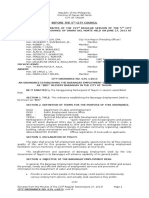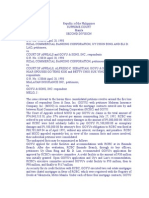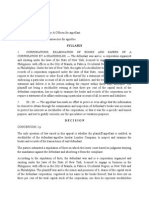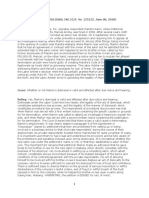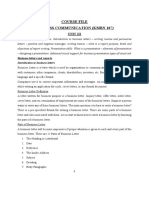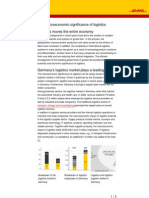0 ratings0% found this document useful (0 votes)
168 viewsLowe Inc Vs CA
Lowe Inc Vs CA
Uploaded by
sharmine_ruizThis case involves a dispute between Lowe Inc., an advertising agency, and its former employee Maria Mutuc over her dismissal. Lowe declared Mutuc's position redundant and terminated her employment. Mutuc filed a complaint alleging illegal dismissal. The NLRC ruled in Mutuc's favor, finding that Lowe did not properly implement a redundancy program and used it as a guise to terminate Mutuc. The Court of Appeals affirmed this ruling but modified the backwage award. On appeal, the Supreme Court affirmed the lower courts' decisions, finding that Lowe had validly implemented a redundancy program and dismissed Mutuc for a legal cause. It also ruled that Lowe's corporate officers could not be held personally liable without evidence of malice or bad faith
Copyright:
Attribution Non-Commercial (BY-NC)
Available Formats
Download as DOC, PDF, TXT or read online from Scribd
Lowe Inc Vs CA
Lowe Inc Vs CA
Uploaded by
sharmine_ruiz0 ratings0% found this document useful (0 votes)
168 views2 pagesThis case involves a dispute between Lowe Inc., an advertising agency, and its former employee Maria Mutuc over her dismissal. Lowe declared Mutuc's position redundant and terminated her employment. Mutuc filed a complaint alleging illegal dismissal. The NLRC ruled in Mutuc's favor, finding that Lowe did not properly implement a redundancy program and used it as a guise to terminate Mutuc. The Court of Appeals affirmed this ruling but modified the backwage award. On appeal, the Supreme Court affirmed the lower courts' decisions, finding that Lowe had validly implemented a redundancy program and dismissed Mutuc for a legal cause. It also ruled that Lowe's corporate officers could not be held personally liable without evidence of malice or bad faith
Original Title
Lowe Inc vs CA
Copyright
© Attribution Non-Commercial (BY-NC)
Available Formats
DOC, PDF, TXT or read online from Scribd
Share this document
Did you find this document useful?
Is this content inappropriate?
This case involves a dispute between Lowe Inc., an advertising agency, and its former employee Maria Mutuc over her dismissal. Lowe declared Mutuc's position redundant and terminated her employment. Mutuc filed a complaint alleging illegal dismissal. The NLRC ruled in Mutuc's favor, finding that Lowe did not properly implement a redundancy program and used it as a guise to terminate Mutuc. The Court of Appeals affirmed this ruling but modified the backwage award. On appeal, the Supreme Court affirmed the lower courts' decisions, finding that Lowe had validly implemented a redundancy program and dismissed Mutuc for a legal cause. It also ruled that Lowe's corporate officers could not be held personally liable without evidence of malice or bad faith
Copyright:
Attribution Non-Commercial (BY-NC)
Available Formats
Download as DOC, PDF, TXT or read online from Scribd
Download as doc, pdf, or txt
0 ratings0% found this document useful (0 votes)
168 views2 pagesLowe Inc Vs CA
Lowe Inc Vs CA
Uploaded by
sharmine_ruizThis case involves a dispute between Lowe Inc., an advertising agency, and its former employee Maria Mutuc over her dismissal. Lowe declared Mutuc's position redundant and terminated her employment. Mutuc filed a complaint alleging illegal dismissal. The NLRC ruled in Mutuc's favor, finding that Lowe did not properly implement a redundancy program and used it as a guise to terminate Mutuc. The Court of Appeals affirmed this ruling but modified the backwage award. On appeal, the Supreme Court affirmed the lower courts' decisions, finding that Lowe had validly implemented a redundancy program and dismissed Mutuc for a legal cause. It also ruled that Lowe's corporate officers could not be held personally liable without evidence of malice or bad faith
Copyright:
Attribution Non-Commercial (BY-NC)
Available Formats
Download as DOC, PDF, TXT or read online from Scribd
Download as doc, pdf, or txt
You are on page 1of 2
Lowe Inc vs CA
In its 30 June 2003 Resolution, the NLRC set
aside the Labor Arbiter’s 15 August 2002
FACTS Decision and declared that Mutuc was
illegally dismissed by Lowe. The NLRC added
Lowe, an advertising agency, is a corporation that Lowe failed to adopt any fair and
duly organized and existing under the laws of reasonable criteria in declaring Mutuc’s
the Philippines. Petitioner Maria Elizabeth position redundant . The NLRC concluded that
“Mariles” L. Gustilo (Gustilo) is the Chief Lowe used redundancy as a guise to get rid of
Executive Officer and President of Lowe, Mutuc even if there was no basis to declare
while petitioner Raul M. Castro (Castro) is the her position redundant. Both Lowe and Mutuc
Executive Creative Director of Lowe. Gustilo filed petitions for certiorari before the Court
and Castro were included in the complaint for of Appeals.
illegal dismissal in their capacity as officers of
Lowe. the Court of Appeals dismissed Lowe’s
petition and affirmed the NLRC’s 30 June
On 23 June 2000, at the height of the influx of 2003 Resolution. In its 13 March 2006
advertising projects, Lowe hired Mutuc as a Decision, the Court of Appeals granted
Creative Director to help out the four other Mutuc’s petition and modified the award of
Creative Directors of Lowe. Mutuc was given backwages. The Court of Appeals agreed with
a salary of P100,000 a month. On 26 the NLRC that Lowe failed to prove two
February 2001, Mutuc became a regular requisites of a valid redundancy program,
employee of Lowe. namely: (1) good faith in abolishing the
redundant position, and (2) fair and
Most of Lowe’s clients reduced their reasonable criteria in ascertaining which
advertising budget. In response to the positions were to be declared redundant. The
situation, Lowe implemented cost-cutting Court of Appeals also said that Lowe should
measures including a redundancy program. not have made Mutuc a regular employee if
On 31 October 2001, Lowe terminated she was incompetent and if her performance
Mutuc’s services because her position was was below par. Moreover, Mutuc’s backwages
declared redundant. should be computed from the time she was
unlawfully dismissed until the decision of the
Subsequently, Mutuc filed a complaint for Court of Appeals becomes final.
illegal dismissal, nonpayment of 13th month
pay with prayer for the award of moral and ISSUES
exemplary ddamages plus attorney’s fees
against Lowe. WON THE COURT OF THE COURT OF APPEALS
DECIDED A QUESTION OF SUBSTANCE IN A
On 15 August 2002, the Labor Arbiter WAY NOT IN ACCORD WITH THE LAW IN
dismissed Mutuc’s complaint and ruled that AFFIRMING THE RULING OF THE NLRC
Lowe validly dismissed Mutuc from the HOLDING THE INDIVIDUAL PETITIONERS
service. RAUL CASTRO AND MARILES GUSTILO LIABLE
TO THE PRIVATE RESPONDENT WHEN THE
The Labor Arbiter ruled that Lowe satisfied SAID CORPORATE OFFICERS HAVE
the requisites for a valid implementation of a PERSONALITIES THAT ARE DISTINCT AND
redundancy program, namely: (1) there was SEPARATE FROM LOWE, AND WHEN THERE IS
notice to Mutuc and the Department of Labor EVEN NO EVIDENCE IN THE RECORDS
and Employment (DOLE); (2) there was an SHOWING THAT THEY EFFECTED THE
offer to pay separation pay, which Mutuc TERMINATION OF THE PRIVATE RESPONDENT
refused to receive since she did not want to WITH MALICE OR BAD FAITH.
process her clearance; (3) that Lowe was
motivated by good faith in declaring Mutuc’s RULING
position redundant; and (4) that the criteria
used by Lowe, which were seniority and Redundancy, which is one of the authorized
efficiency, to determine which position was causes for the dismissal of an employee.
redundant, were fair and reasonable. Redundancy exists when the service of an
employee is in excess of what is reasonably
the Labor Arbiter ruled that Gustilo and demanded by the actual requirements of the
Castro could not be held liable for the business.for a valid implementation of a
monetary awards to Mutuc since they were redundancy program, the employer must
merely acting in the performance of their comply with the following requisites: (1)
duties and there was no showing that they written notice served on both the employee
acted deliberately or maliciously to evade any and the DOLE at least one month prior to the
obligation to Mutuc. intended date of termination; (2) payment of
separation pay equivalent to at least one
month pay or at least one month pay for which are distinct and separate from
every year of service, whichever is higher; (3) that of Lowe’s. Hence, in the absence of
good faith in abolishing the redundant any evidence showing that they acted with
position; and (4) fair and reasonable criteria in malice or in bad faith in declaring Mutuc’s
ascertaining what positions are to be declared position redundant, Gustilo and Castro are
redundant. not personally liable for the monetary awards
to Mutuc.
Among the accepted criteria in implementing
a redundancy program are: (1) preferred Hence, LA decision is hereby affirmed.
status; (2) efficiency; and (3) seniority.
We agree with the Labor Arbiter that
Lowe employed fair and reasonable
criteria in declaring Mutuc’s position
redundant. Mutuc, who was hired only on
23 June 2000, did not deny that she was the
most junior of all the executices of Lowe.
Mutuc also did not present contrary evidence
to disprove that she was the least efficient
and least competent among all the Creative
Directors.
The determination of the continuing
necessity of a particular officer or position in
a business corporation is a management
prerogative, and the courts will not interfere
unless arbitrary or malicious action on the
part of management is shown. Since
Mutuc’s dismissal is for an authorized
cause, she is not entitled to backwages.
It is settled that in the absence of
malice, bad faith, or specific provision of
law, a director or an officer of a
corporation cannot be made personally
liable for corporate liabilities. In Mcleod
v. NLRC, we said:
To reiterate, a corporation is a juridical
entity with legal personality separate and
distinct from those acting for and in its behalf
and, in general, from the people comprising
it. The rule is that obligations incurred
by the corporation, acting through its
directors, officers, and employees are
its sole liabilities. Personal liability of
corporate directors, trustees or officers
attaches only when (1) they assent to a
patently unlawful act of the corporation, or
when they are guilty of bad faith or
gross negligence in directing its affairs,
or when there is a conflict of interest resulting
in damages to the corporation, its
stockholders or other persons; (2) they
consent to the issuance of watered down
stocks or when, having knowledge of such
issuance, do not forthwith file with the
corporate secretary their written objection;
(3) they agree to hold themselves personally
and solidarily liable with the corporation; or
(4) they are made by specific provision of law
personally answerable for their corporate
action. (Emphasis supplied)
Gustilo and Castro, as corporate
officers of Lowe, have personalities
You might also like
- Manager Job Interview Questions and AnswersDocument9 pagesManager Job Interview Questions and AnswersAnonymous eILCSdHqJ100% (3)
- Prejudice Against Reservation Policies: How and Why?: February 2016Document10 pagesPrejudice Against Reservation Policies: How and Why?: February 2016Bini FrancisNo ratings yet
- Intestate Estate of The Deceased Luz Garcia. Pablo G. UTULO, Applicant-Appellee, VsDocument75 pagesIntestate Estate of The Deceased Luz Garcia. Pablo G. UTULO, Applicant-Appellee, VsMary Carmille DauloNo ratings yet
- CO 634 - 13 - Barangay Employment Desk BEDDocument3 pagesCO 634 - 13 - Barangay Employment Desk BEDana teresa buslonNo ratings yet
- Lowe Inc v. CADocument2 pagesLowe Inc v. CANinaNo ratings yet
- Case Digest On Concealment: Insurance LawDocument10 pagesCase Digest On Concealment: Insurance LawRaq KhoNo ratings yet
- Batiquin vs. CADocument7 pagesBatiquin vs. CAWilfredNo ratings yet
- Jurisprudence On Authority of President On Behalf of CorporationDocument2 pagesJurisprudence On Authority of President On Behalf of CorporationAndres SoguilonNo ratings yet
- Complaint CoSMDocument4 pagesComplaint CoSMRgenieDictadoNo ratings yet
- Remedial Law Review SA BE 2015Document30 pagesRemedial Law Review SA BE 2015nahjassi mangateNo ratings yet
- Tan v. SEC (Jore)Document2 pagesTan v. SEC (Jore)mjpjoreNo ratings yet
- Updated Template CDA CLAP MOADocument9 pagesUpdated Template CDA CLAP MOAsheena rimaNo ratings yet
- Part 3, #1, de Leon vs. NLRCDocument2 pagesPart 3, #1, de Leon vs. NLRCnaaguilarNo ratings yet
- 10 Genil Vs RiveraDocument9 pages10 Genil Vs RiveraLimberge Paul CorpuzNo ratings yet
- Evidence Case List 1 STDocument1 pageEvidence Case List 1 STEmmanuel Gomez de Peralta Jr.No ratings yet
- ALS Policies and Procedures On Academic Integrity and Plagiarism 11-23-18 PDFDocument7 pagesALS Policies and Procedures On Academic Integrity and Plagiarism 11-23-18 PDFArtisticLawyerNo ratings yet
- Patricio Bello vs. Eugenia Ubo DigestDocument3 pagesPatricio Bello vs. Eugenia Ubo DigestElla ThoNo ratings yet
- Torts Case Digest 4Document19 pagesTorts Case Digest 4Emjie King100% (1)
- RCBC v. CA, 289 SCRA 292 (1998)Document14 pagesRCBC v. CA, 289 SCRA 292 (1998)KristineSherikaChyNo ratings yet
- 17Document4 pages17Mariel Joyce PortilloNo ratings yet
- Case DigestsDocument6 pagesCase DigestsAgz MacalaladNo ratings yet
- Report1 (Feb. 9)Document13 pagesReport1 (Feb. 9)Mary LouiseNo ratings yet
- ME Gray Vs Insular Lumber CompanyDocument3 pagesME Gray Vs Insular Lumber CompanyEl G. Se ChengNo ratings yet
- The Qualifieds in Criminal LawDocument2 pagesThe Qualifieds in Criminal LawDennis Aran Tupaz AbrilNo ratings yet
- Dokumen - Tips - Paramount V Ac Ordonez DigestdocxDocument2 pagesDokumen - Tips - Paramount V Ac Ordonez DigestdocxJ castNo ratings yet
- Read The Case of PIONEER INSURANCE AND SURETY CORPORATION VsDocument2 pagesRead The Case of PIONEER INSURANCE AND SURETY CORPORATION VsJr MateoNo ratings yet
- 178 Digest Uichico Vs NLRCDocument2 pages178 Digest Uichico Vs NLRCIamIvy Donna PondocNo ratings yet
- Philtrust Company Vs CADocument8 pagesPhiltrust Company Vs CAJeliza ManaligodNo ratings yet
- Paz vs. New International Environmental Universality, Inc.Document12 pagesPaz vs. New International Environmental Universality, Inc.8111 aaa 1118No ratings yet
- Bpi Vs Iac 164 Scra 630 1988Document5 pagesBpi Vs Iac 164 Scra 630 1988ShielaMarie MalanoNo ratings yet
- San Roque Vs CirDocument2 pagesSan Roque Vs Cirj guevarraNo ratings yet
- 2006 August Case TitlesDocument10 pages2006 August Case TitlesjafernandNo ratings yet
- Atty. Geromo vs. La Paz HousingDocument2 pagesAtty. Geromo vs. La Paz HousingJenely Joy Areola-TelanNo ratings yet
- Case Digests On Civil Procedure Part IIDocument14 pagesCase Digests On Civil Procedure Part IIJasfher CallejoNo ratings yet
- 10-G.R No. 148597Document4 pages10-G.R No. 148597Sugar ReeNo ratings yet
- VILLAROEL Vs ESTRADA G.R. No. 47362 December 19, 1940Document1 pageVILLAROEL Vs ESTRADA G.R. No. 47362 December 19, 1940Anna NicerioNo ratings yet
- Land Titles and Deeds CasesDocument136 pagesLand Titles and Deeds CasesFillineBienAbrogarLeciasNo ratings yet
- 36.alhambra Cigar & Cigarette Manufacturing Co., Inc. vs. Securities and Exchange CommissionDocument9 pages36.alhambra Cigar & Cigarette Manufacturing Co., Inc. vs. Securities and Exchange Commissionvince005No ratings yet
- Planters Products, Inc. vs. Court of AppealsDocument4 pagesPlanters Products, Inc. vs. Court of Appealsmei atienzaNo ratings yet
- Ibanez V Hongkong Shanghai BankDocument5 pagesIbanez V Hongkong Shanghai BankAndrew GallardoNo ratings yet
- Philippine Guideline For RegistrationDocument11 pagesPhilippine Guideline For RegistrationNoples RozaliaNo ratings yet
- Assignment - Case Digest - Servicewide and Great Pacific Life - v4Document1 pageAssignment - Case Digest - Servicewide and Great Pacific Life - v4Cheryl Grace RabeNo ratings yet
- Gutierrez Vs Capital InsuranceDocument1 pageGutierrez Vs Capital InsuranceAllen Michael B. EscuderoNo ratings yet
- Canon 18 CasesDocument15 pagesCanon 18 CasesMargarette Pinkihan SarmientoNo ratings yet
- Paz V NIEUDocument8 pagesPaz V NIEUChoi ChoiNo ratings yet
- Maasin City, Southern LeyteDocument2 pagesMaasin City, Southern LeyteSunStar Philippine NewsNo ratings yet
- Airborne Maintenance and Allied Services Inc. vs. Arnulfo M. EgosDocument2 pagesAirborne Maintenance and Allied Services Inc. vs. Arnulfo M. EgosMonyeen SesanteNo ratings yet
- Marlon L. Arcilla v. Zulisibs, IncDocument1 pageMarlon L. Arcilla v. Zulisibs, Incmar corNo ratings yet
- Santos Vs LumbaoDocument2 pagesSantos Vs LumbaoYvon BaguioNo ratings yet
- REPUBLIC V Vda de NeriDocument1 pageREPUBLIC V Vda de NeriAliw del Rosario0% (1)
- Petitioners, - Versus - : FactsDocument4 pagesPetitioners, - Versus - : FactsJoy Dela Cerna BazanNo ratings yet
- PCIC v. Central Colleges of The Phil.Document13 pagesPCIC v. Central Colleges of The Phil.Karl Francis EstavillaNo ratings yet
- Amurao vs. Court of AppealsDocument3 pagesAmurao vs. Court of AppealsadonaiaslaronaNo ratings yet
- SpecPro - (10) - (G.R.No.L-19064) - Torres vs. TorresDocument2 pagesSpecPro - (10) - (G.R.No.L-19064) - Torres vs. TorresOjie SantillanNo ratings yet
- 29.negotiable Instrument Law Bar Exa Q and A - RemorozoDocument2 pages29.negotiable Instrument Law Bar Exa Q and A - RemorozoKC RemorozoNo ratings yet
- The Philippine American General Insurance Company, Inc. v. Court of AppealsDocument16 pagesThe Philippine American General Insurance Company, Inc. v. Court of AppealsLiene Lalu NadongaNo ratings yet
- Fores V Miranda DigestDocument1 pageFores V Miranda DigestKio Paulo Hernandez SanAndresNo ratings yet
- Holcim Philippines Inc Vs ObraDocument3 pagesHolcim Philippines Inc Vs Obramerren bloomNo ratings yet
- Lhuillier V VelayoDocument10 pagesLhuillier V Velayofjl_302711No ratings yet
- 17 Azucarera vs. Heirs of ApostolDocument3 pages17 Azucarera vs. Heirs of ApostolCJ FaNo ratings yet
- Ruling and Order On Motion For Prejudgment Remedy and Motion For Disclosure of AssetsDocument17 pagesRuling and Order On Motion For Prejudgment Remedy and Motion For Disclosure of AssetsHeel By NatureNo ratings yet
- Raul C. Cosare v. Broadcom Asia Inc. and Dante ArevaloDocument4 pagesRaul C. Cosare v. Broadcom Asia Inc. and Dante ArevaloRam Migue SaintNo ratings yet
- Marc II MarketingDocument19 pagesMarc II MarketingJollyCostalesLariozaNo ratings yet
- Sample Deed of SaleDocument4 pagesSample Deed of SaleSharie RuízNo ratings yet
- Deed of Grant of Usufructuary RightsDocument3 pagesDeed of Grant of Usufructuary Rightssharmine_ruiz100% (2)
- Deed of Grant of Usufructuary RightsDocument3 pagesDeed of Grant of Usufructuary Rightssharmine_ruizNo ratings yet
- GSIS Vs The City Treasurer of Manila DigestDocument3 pagesGSIS Vs The City Treasurer of Manila Digestsharmine_ruizNo ratings yet
- New Contractor'S License Application: Required Items Complied Yes No NADocument23 pagesNew Contractor'S License Application: Required Items Complied Yes No NAsharmine_ruizNo ratings yet
- Reformina Vs Tomol DigestDocument2 pagesReformina Vs Tomol Digestsharmine_ruizNo ratings yet
- Obligations of The AgentDocument15 pagesObligations of The Agentsharmine_ruiz100% (2)
- Grimalt Vs Velasquez DigestDocument1 pageGrimalt Vs Velasquez Digestsharmine_ruizNo ratings yet
- Mediran Vs VillanuevaDocument1 pageMediran Vs Villanuevasharmine_ruizNo ratings yet
- McDonalds Culture and Employment CaseDocument2 pagesMcDonalds Culture and Employment CaseZayedul Haque ZayedNo ratings yet
- Chapter 11 ManagementDocument23 pagesChapter 11 Managementyahia adelشفاسلمتت يا100% (1)
- Code of Ethics Delta Air LineDocument37 pagesCode of Ethics Delta Air LineSameer SawantNo ratings yet
- Project On Types of MarketingDocument36 pagesProject On Types of MarketingKhushbu ShrivastavNo ratings yet
- Fundamentals of Human Resource Management: Decenzo and RobbinsDocument16 pagesFundamentals of Human Resource Management: Decenzo and RobbinsshafianikNo ratings yet
- Union Carbide Labor Union v. Union CarbideDocument4 pagesUnion Carbide Labor Union v. Union CarbideHans LazaroNo ratings yet
- BC KMBN107 Unit 3Document26 pagesBC KMBN107 Unit 3Rizwan SaifiNo ratings yet
- 0 Periksa ScoreDocument46 pages0 Periksa ScorescribdNo ratings yet
- Leadership VolkswagenDocument18 pagesLeadership Volkswagenkanishka katariaNo ratings yet
- Impact of Employee Turnover On Organisational Effectiveness in Tele Communication Sector of PakistanDocument9 pagesImpact of Employee Turnover On Organisational Effectiveness in Tele Communication Sector of PakistanManpreet Kaur VirkNo ratings yet
- BSN4 NCM 119 FinalsDocument14 pagesBSN4 NCM 119 FinalsAlexie NicoleNo ratings yet
- Developing Assignment 2Document14 pagesDeveloping Assignment 2F-UOB-13B L� Gia KhoaNo ratings yet
- Capt. David Spicer ComplaintDocument20 pagesCapt. David Spicer ComplaintLaw&CrimeNo ratings yet
- Tys Resume 2021 MarchDocument2 pagesTys Resume 2021 Marchapi-449606618No ratings yet
- Poea JobsDocument2 pagesPoea JobsLeo FuentesNo ratings yet
- School Clearance Form: CS Form No. 7 Series of 2017Document4 pagesSchool Clearance Form: CS Form No. 7 Series of 2017Selyn MontajesNo ratings yet
- Job Application Letter HR PositionDocument6 pagesJob Application Letter HR Positiondud1nylofas2100% (1)
- Taking The Lead: A Guide To More Responsible Procurement PracticesDocument29 pagesTaking The Lead: A Guide To More Responsible Procurement Practicesvij2053No ratings yet
- TCF - Contractor's Site Safety ProgrameditedDocument148 pagesTCF - Contractor's Site Safety ProgrameditedSabre Alam0% (1)
- 06 25jul2013 PDFDocument3 pages06 25jul2013 PDFsaurabhrdeshpandeNo ratings yet
- Chap 015Document13 pagesChap 015zoomblue200No ratings yet
- 13 Mudit Gupta Labour LawDocument14 pages13 Mudit Gupta Labour LawMudit GuptaNo ratings yet
- FORM-014 PRF Personnel Requisition FormDocument1 pageFORM-014 PRF Personnel Requisition FormExanet Human ResourceNo ratings yet
- MacroeconomicsDocument3 pagesMacroeconomicsLaxmikant NandapurkarNo ratings yet
- PCR Manual 2012 PDFDocument134 pagesPCR Manual 2012 PDFLex Tamen Coercitor100% (2)
- Perez Vs Philippine Telegraph and Telephone CompanyDocument2 pagesPerez Vs Philippine Telegraph and Telephone Companykarl doceoNo ratings yet
- Employment ContractDocument2 pagesEmployment ContractResidency Libre VerdadNo ratings yet



